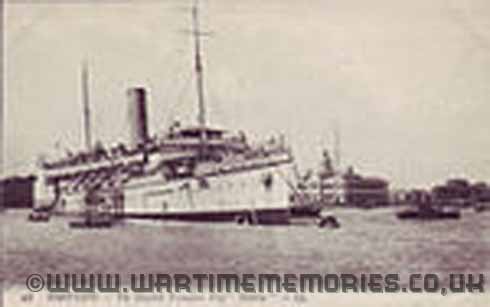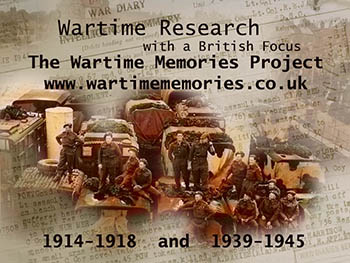Rohilla was a steamship of the British India Steam Navigation Company which ran aground in 1914 while serving as HMHS Rohilla (His Majesty's Hospital Ship Rohilla). The steamship was named Rohilla in honour of Rohillas, Afghan highlanders (Roh means mountains and Rohilla literally means mountaineer or highlander) who entered India with Nadir Shah Durrani and were awarded territory in northern India later renamed Rohilkhand, in the modern Uttar Pradesh state.
Rohilla (7,114 tons gross) was built in 1906 in Belfast by Harland & Wolff. It was called up at the outset of World War I and converted into a naval hospital ship.
30th Oct 1914 Dramatic Rescue at Whitby 
SS Rohilla at Port Said - pre WW1
In heavy seas the Hospital Ship Rohilla, sailing from Queensferry, bound for Dunkirk, ran aground on rocks at Saltwick Bay, Whitby. The Whitby lifeboat succeeded in rescuing 35 people, including five female nurses, but the lifeboat was badly damaged in the attempt and was rendered useless. Lifeboats from along the coast were brought to assist, including the Upgang boat which was brought overland, lowered down the cliff and a launch attempted from the beach at Saltwick and the Scarborough boat which was towed from its home town by a trawler and spent the might at sea but was unable to reach the Rohilla. The Hartlepool lifeboat was towed to Whitby, the Teesmouth lifeboat set out to assist but was damaged by heavy seas. The Tynemouth boat, the only motorised lifeboat in the area, was summoned and sailed 40 miles to reach the Rohilla and finally succeeding in rescuing the remaining crew from the wreck two days after the ship had run aground. Of the 229 persons onboard the hospital ship, 145 were brought ashore safely.
31st Oct 1914 Hospital ship grounded
_grounded_1914.jpg)
HMHS Rohilla
Sailing south through the North Sea, at around 0400 on 30 October 1914 the Rohilla struck Whitby Rock, a reef at Saltwick east of Whitby. At the time there was a fierce gale and due to wartime blackout conditions no landmarks were visible. Although the ship was only 600 metres from shore, the treacherous conditions of the high seas and storm force winds made rescue difficult.
Rockets with ropes attached were fired from the cliffs, but all missed. The Rohilla had no rockets of her own. Due to the weather conditions Whitby's lifeboat could not be launched from the harbour, so it was carried by hand over an eight-foot seawall and across rocks so that it could be launched from the foreshore nearest the ship. The five women aboard the ship were the first to be rescued. Seventeen survivors were taken during the lifeboat's first run, and another eighteen were rescued on its second; however, the lifeboat itself was too badly damaged to continue the rescue.
Six Royal National Lifeboat Institution lifeboats (Bradford, John Fielden, Queensbury, Robert and Mary Ellis, William Riley of Birmingham and Leamington and the Henry Vernon) carried out a rescue operation lasting fifty hours, saving many of the 229 people on board, but 85 lives were lost in the disaster.
Amongst those rescued from Rohilla was Mary Kezia Roberts, who had survived the sinking of RMS Titanic just two years earlier in 1912.
The Empire Gallantry Medal (later changed to the George Cross) was awarded to Major Burton of the Tynemouth lifeboat Henry Vernon for his role in the rescue.
The Gold Medal of the Royal National Lifeboat Institution, the highest honour the institute could award, was presented to Coxswain Thomas Langlands and Coxswain Robert Smith. The Silver Medal, the Royal National Lifeboat Institution’s second highest award, was bestowed on Second Coxswain Richard Eglon, Second Coxswain James’ Brownlee, Lieutenant Bazil Hall RN, and George Peart, who also received £10.
Lloyds Agent, Captain John Milburn, received a letter of thanks and a pair of binoculars. Whitby Police received £10 from the R.N.L.I. and £25 from the owners of the Rohilla. The crews of the lifeboat John Fielden and Henry Vernon got additional cash payments. Captain Neilson was awarded the Bronze Medal of the Royal Society for the Prevention of Cruelty to Animals, for his efforts in the rescue of the ship's cat.
Rescue Attempts - another account.
Whitby’s tale of courage and endurance took place on 30 October 1914 as the HMHS Rohilla (a naval hospital ship), travelling to Dunkirk to pick up the wounded, struck Whitby Rock. Although only meters from shore, the high seas and storm force winds made any rescue difficult. Whitby's RNLI lifeboat was carried by hand over a seawall to be launched from the beach. Eventually six lifeboats battled the sea to reach the ship, fill up with desperate passengers and return them to the shore.
The unrelenting courage of the volunteer RNLI lifeboat crews and the community of Whitby, who worked for over 50 hours, saved 144 lives.
Three Gold* and four Silver RNLI Medals for Gallantry, the Empire Gallantry Medal and the Bronze Medal of the Royal Society for the Prevention of Cruelty to Animals were awarded to Whitby and Tynemouth RNLI volunteers, and to others, involved in the rescue. (*The Gold RNLI medal is often referred to as the lifeboat crew VC).
John Doran
If you can provide any additional information, please add it here.


_grounded_1914.jpg)



